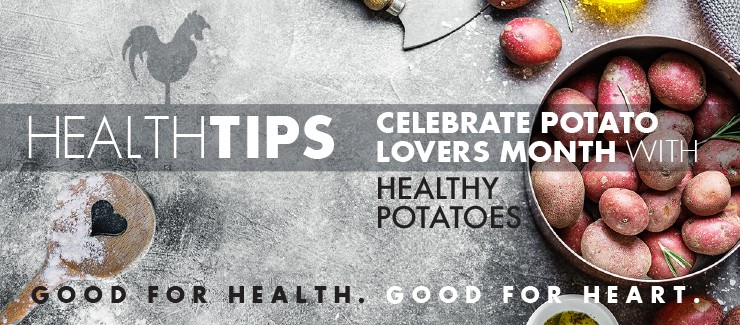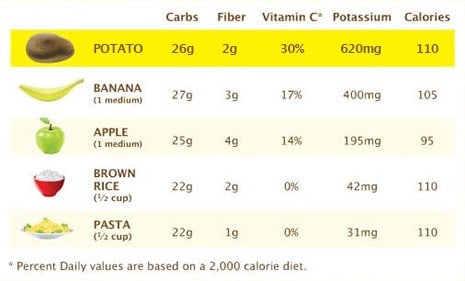
Potatoes are the favorite vegetable crop in America. They’re fulfilling, rich, and of course, delicious. Unfortunately, there’s a misconception that potatoes aren’t good for you. The truth is that processed and fried potatoes topped with butter, sour cream, and oil aren’t conducive to your health, but natural and non-processed potatoes are heart-checked by the American Heart Association.
Potatoes are great for your health when prepared right! By “prepared right,” we mean in any way other than fried. This leaves so many options, like baked, mashed, broiled, and more! Just check out our potato recipes available.
Since it’s February, it’s Potato Lovers Month! So let’s explore why potatoes are so great. First of all, America’s favorite potato is certified by the American Heart Association. The heart check mark is a signal to consumers that potatoes are a great addition to a balanced and healthy diet.

Photo Courtesy of the Idaho Potato Commission
One potato is only about 110 calories with zero fat, cholesterol, or sodium. All the while, they provide an extremely important nutrient: potassium. Eating enough potassium in your diet lowers your risk of certain diseases, like stroke. Most Americans might think that bananas are the best source of potassium, but a potato has nearly twice the amount of potassium per serving! In fact, potatoes provide about 25% of the daily recommendation of this nutrient.
The increase in potassium reduces your risk of heart disease. Additionally, potatoes also improve your bone health because potassium neutralizes the effect of harmful bone-eating acids. Finally, it also regulates blood pressure, because the nutrient balances out the negative effects of salt.

Photo Courtesy of the Idaho Potato Commission
Potatoes also pack 45% daily value of vitamin C and 2 to 3 grams of fiber. The vitamin C acts as an antioxidant. An antioxidant can prevent or delay cell damage, supporting your immune system. This can help prevent anything from scurvy to a common cold! The high fiber content aids in digestion, keeping your gut healthy and regular.
The last major nutrient we’ll explore is B6. B6 vitamins are critical in maintaining neurological health because it is used to create brain chemicals. A lack of B6 in your diet can lead to depression, stress, and perhaps even attention deficit hyperactivity disorder (ADHD). Potatoes also have needed carbohydrates which maintain blood glucose levels, necessary for proper brain function. Fun fact from the American Journal of Clinical Nutrition: An increase in glucose can help enhance learning and memory!
Let’s also explore some interesting facts about potatoes!
- Potatoes are grown in every single state in America, but Idaho is known for them. Their license plates bear the slogan: “Famous Potatoes.”
- An average American will consume around 124 pounds of potatoes per year! (Germans eat about twice this much!)
- French fries were introduced to the United States by Thomas Jefferson, who served them in the White House.
- The potato was the first vegetable grown in space in October of 1995. The idea was to feed astronauts on long space voyages!
- The US Department of Agriculture has stated that “a diet of whole milk and potatoes would supply almost all of the food elements necessary for the maintenance of the human body.”
While potatoes dipped in popularity a few years ago due to the fad of low-carb diets, it has returned as one of America’s favorite foods. This is a good thing, seeing as they are a fantastic addition to a healthy and balanced diet! The nutrients in potatoes help ward off disease and overall benefit health.

In fact, cutting potatoes out of your diet for the sake of weight loss is counterintuitive. They’re great for weight management and loss because they act as “bulking agents.” This means they satisfy and reduce appetite, so a person feels fuller longer and less likely to consume more calories. And you’re getting all the nutrients we discussed above!
So celebrate Potato Lovers Month with us by enjoying healthy potatoes! Be sure to check out what recipes we have available, too!





Comments